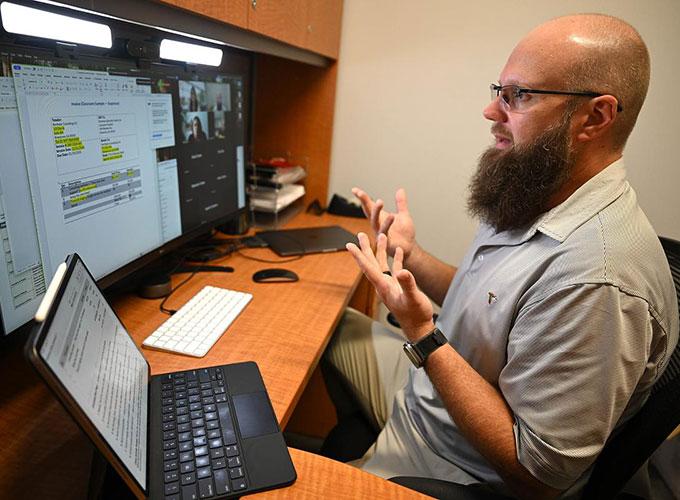In his 14 years at Georgia Gwinnett College (GGC), Dr. Ali “AJ” Kooti, assistant professor of accounting, has emphasized connecting classroom lessons to real-world applications. Among the most significant changes he has witnessed is the growing influence of artificial intelligence (AI).
“AI is out there and it’s not going away. Like most things, there are two sides to the coin,” he said. “It can be used for unethical things like cheating, but the reason I’ve infused AI into my accounting classes is to teach my students how to use it responsibly. AI can be used for a lot of good when it’s treated ethically and skeptically.”
The course topics in his accounting 4700 class include analyzing accounting data using AI tools and techniques, developing techniques to detect irregularities that may signal fraud, critically evaluating ethical, legal and regulatory implications, and applying AI driven models to solve real-world accounting challenges.
Kooti has had both expected and unexpected feedback from students so far.
“Some struggled with AI because of the fear it would impact their grade or the student integrity standard,” he said. “I’m glad that they care about the integrity of their work. What I’m hearing now is that they’re learning to use AI to improve function and efficiency in their work."
For Aliya Mounphoxay, a junior pursuing a bachelor’s degree in business administration with an accounting concentration, the class has taught her some important things about AI use.
“I’ve learned the importance of writing detailed prompts in order to get meaningful results from AI,” she said. “For example, in one project we prompted AI to create formulas for a bank reconciliation Excel sheet using a cash ledger and a bank statement. That experience showed me not only how much time AI can save on complex tasks, but also how it can enhance accuracy and reduce the stress of trial-and-error in technical work.”
Candice Stephens, a senior who is studying accounting, the class has helped her navigate the use of AI.
“I was a big fan of AI and didn't know that it could be trusted to give correct answers,” she said. “Now I'm learning a little more on how to navigate it and get what you need it to do.”
The class has taught Kooti a few things as well.
“I expected my students would simply ask broader questions using AI for their assignments,” he said. “What I’ve found is that they are going deeper than I anticipated and asking much more detailed questions.”
That approach to AI has been especially helpful for Mounphoxay.
“Before, I thought using AI might be considered cheating. Now I realize that creating strong prompts is part of the work, and using AI effectively requires critical thinking,” she said. “It’s a tool to improve efficiency and problem-solving, not a shortcut. My view of AI has shifted from skepticism to seeing it as a valuable professional resource.”
Photo by Daniel Melograna/Georgia Gwinnett College.

